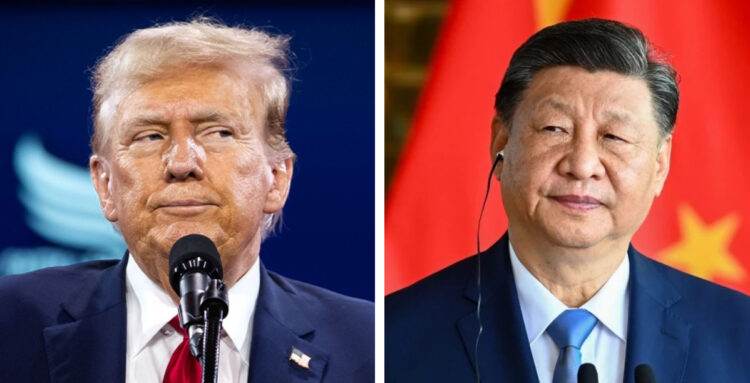China and the U.S. are back at it again with another trade war. After Trump hiked tariffs on Chinese goods, China wasted no time hitting back with its own taxes on U.S. products.
But this time, China’s making it clear — it’s not backing down. “If war is what the U.S. wants, be it a tariff war, a trade war or any other type of war, we’re ready to fight till the end,” the Chinese embassy declared.
And with new tariffs on key American exports, things are getting tense fast.
Trump doubles tariffs on Chinese imports
In February, Trump started off with a 10% tariff on Chinese imports, but he cranked it up to 20% on March 4. That same day, he also slapped 25% tariffs on Mexico and Canada.
According to him, it’s all about national security and stopping drug trafficking. But China wasn’t having it.
China hits back with its own tariffs
China wasted no time hitting back. In response, it slapped new tariffs ranging from 10% to 15% on a variety of American agricultural imports.
A 15% tariff now applies to U.S. chicken, wheat, corn, and cotton, while a 10% tariff affects pork, beef, seafood, fruits, vegetables, and dairy.
China stops key U.S. imports, including soybeans
In another blow to U.S. businesses, China has suspended some key American exports. The biggest hit? Soybeans.
American farmers have already been struggling with market uncertainty, and this latest move from China puts even more pressure on them. Alongside soybeans, China has also halted lumber imports from the U.S.
China’s tariffs take aim at Trump’s supporters

China isn’t just throwing out random tariffs — it’s being strategic. According to Alfredo Montufar-Helu, head of the China Center for the Conference Board, the measures are “a restrained, targeted approach aimed at causing pain to those industries that matter the most to the supporters of the Trump administration.”
This means key American industries — especially agriculture — are bearing the brunt of China’s retaliation. The move is designed to hit Trump politically, putting pressure on him from within the U.S.
China’s strong message: ‘We’ll fight till the end’

The Chinese embassy didn’t sugarcoat anything. They made it clear on X: “If war is what the U.S. wants…we’re ready to fight till the end.”
Foreign Ministry spokesperson Lin Jian echoed the same message, saying China will not bow to “hegemony or bullying.”
China expands its retaliation

Beyond tariffs, China has taken further steps to restrict U.S. business operations within its borders. Ten American firms have been added to China’s “unreliable entity list,” meaning they can’t make new investments or import/export goods in China.
Additionally, 15 U.S.-based companies have been placed on an export control list, limiting their ability to trade with China.
China’s Ministry of Commerce justified these actions, stating: “China has decided to include 15 U.S. entities that endanger China’s national security and interests in the export control list, prohibiting the export of dual-use items to them.”
Domestic growth is now China’s priority
Despite the growing trade tensions, China is determined to hit its economic targets. The country has set a goal of around 5% growth for the year, and officials say they plan to achieve this by focusing on domestic demand rather than relying on exports.
China’s economy has long been fueled by exports, but with U.S. trade becoming more unpredictable, it’s shifting gears and betting on internal consumption to drive its growth.
Trump justifies the tariffs
The White House has defended its tariffs by linking them to national security. According to an official statement, the tariffs were implemented to combat “the extraordinary threat to U.S. national security, including our public health posed by unchecked drug trafficking.”
A press release also accused Chinese officials of failing to stop criminal cartels from laundering money or to cut off precursor chemicals used to manufacture fentanyl — which has fueled America’s opioid crisis.
Trump’s administration claims the tariffs are a necessary response to China’s inaction.
China’s next moves
Beijing isn’t done yet. They just announced extra taxes on U.S. coal, liquified natural gas, crude oil, and farming equipment.
This is in addition to the tariffs on agricultural products, showing they’re ready to dig in for the long haul.
Uncertain future for US-China relations
Sun Chenghao, an international relations professor at Tsinghua University, believes the tensions aren’t going away anytime soon. While both countries may eventually return to the negotiating table, he doesn’t see that happening in the near future.
“The U.S. hopes to get a trade deal with China in the end. For the long term, it is possible that China and the U.S. will continue to negotiate, but the current atmosphere is not good,” Sun said.
For now, the trade war is in full swing, and neither side seems ready to back down.

















































